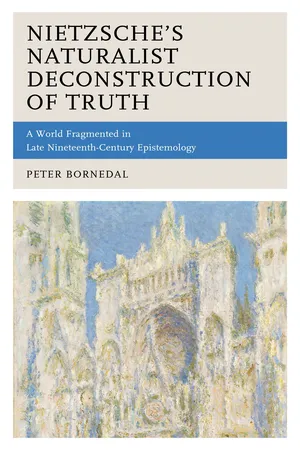
eBook - PDF
Nietzsche's Naturalist Deconstruction of Truth
A World Fragmented in Late Nineteenth-Century Epistemology
- 301 pages
- English
- PDF
- Available on iOS & Android
eBook - PDF
Nietzsche's Naturalist Deconstruction of Truth
A World Fragmented in Late Nineteenth-Century Epistemology
About this book
Nietzsche's Naturalist Deconstruction of Truth: A World Fragmented in Late Nineteenth-Century Epistemology offers a new interpretation of Nietzsche's discussions of truth and knowledge, covering the period from his early essay "On Truth and Lies in an Extra-Moral Sense" to his late notebooks. It places these discussions in the context of the neo-Kantian, Naturalist, Positivist, and Pragmatic schools influential in Nietzsche's late nineteenth-century Europe. Peter Bornedal argues for a view of Nietzsche's epistemological thought as an elaboration of this paradigm: proposing ideas that are anti-metaphysical and anti-theological in their polemic orientation, and in general promoting new scientific naturalist ideals in the discussions of knowledge. Bornedal suggests that the rational pursuit of these new ideals to the unencumbered mind logically leads to Nihilism in its most profound epistemological sense. Nietzsche's "critique of metaphysics" is thus seen as having sprung from sources different from and, at times, in patent opposition to more recent postmodern and deconstructionist critiques. This book contextualizes Nietzsche in relation to a number of philosophical peers and juxtaposes him to contemporary thinkers in a way that resolves some of the difficulties that have plagued recent Nietzsche scholarship.
Frequently asked questions
Yes, you can cancel anytime from the Subscription tab in your account settings on the Perlego website. Your subscription will stay active until the end of your current billing period. Learn how to cancel your subscription.
At the moment all of our mobile-responsive ePub books are available to download via the app. Most of our PDFs are also available to download and we're working on making the final remaining ones downloadable now. Learn more here.
Perlego offers two plans: Essential and Complete
- Essential is ideal for learners and professionals who enjoy exploring a wide range of subjects. Access the Essential Library with 800,000+ trusted titles and best-sellers across business, personal growth, and the humanities. Includes unlimited reading time and Standard Read Aloud voice.
- Complete: Perfect for advanced learners and researchers needing full, unrestricted access. Unlock 1.4M+ books across hundreds of subjects, including academic and specialized titles. The Complete Plan also includes advanced features like Premium Read Aloud and Research Assistant.
We are an online textbook subscription service, where you can get access to an entire online library for less than the price of a single book per month. With over 1 million books across 1000+ topics, we’ve got you covered! Learn more here.
Look out for the read-aloud symbol on your next book to see if you can listen to it. The read-aloud tool reads text aloud for you, highlighting the text as it is being read. You can pause it, speed it up and slow it down. Learn more here.
Yes! You can use the Perlego app on both iOS or Android devices to read anytime, anywhere — even offline. Perfect for commutes or when you’re on the go.
Please note we cannot support devices running on iOS 13 and Android 7 or earlier. Learn more about using the app.
Please note we cannot support devices running on iOS 13 and Android 7 or earlier. Learn more about using the app.
Yes, you can access Nietzsche's Naturalist Deconstruction of Truth by Peter Bornedal in PDF and/or ePUB format, as well as other popular books in Philosophy & 19th Century History. We have over one million books available in our catalogue for you to explore.
Information
Table of contents
- Cover
- Nietzsche’s NaturalistDeconstruction of Truth
- Nietzsche’s NaturalistDeconstruction of TruthA World Fragmented in LateNineteenth-Century Epistemology
- Copyright
- Contents
- Introduction
- Part I: Nietzsche’s Early Theory of Truth and Knowledge
- Part II: Nietzsche’s Positivist-Pragmatic Paradigm